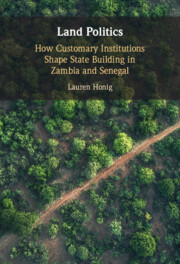Book contents
- Land Politics
- Land Politics
- Copyright page
- Contents
- Figures
- Tables
- Acknowledgments
- 1 Introduction
- 2 Plot by Plot
- 3 Why Institutions Matter
- 4 The Institutional Foundations of Land Authority in Zambia and Senegal
- 5 The Unofficial Differences among Official Chiefs in Zambia
- 6 Holding Ground in Senegal
- 7 Exit or Engagement
- 8 Conclusion
- Book part
- References
- Index
3 - Why Institutions Matter
A Theory of Collective Costs and Customary Constraints in Land Titling
Published online by Cambridge University Press: 11 August 2022
- Land Politics
- Land Politics
- Copyright page
- Contents
- Figures
- Tables
- Acknowledgments
- 1 Introduction
- 2 Plot by Plot
- 3 Why Institutions Matter
- 4 The Institutional Foundations of Land Authority in Zambia and Senegal
- 5 The Unofficial Differences among Official Chiefs in Zambia
- 6 Holding Ground in Senegal
- 7 Exit or Engagement
- 8 Conclusion
- Book part
- References
- Index
Summary
Chapter 3 introduces a new theoretical model, which highlights the tensions between collective costs and concentrated benefits that make land titling political. Institutions matter because they shape how members perceive and are held accountable to these collective costs, including to the institution’s power base. After elaborating mechanisms by which institutions influence the decisions of chiefs and citizens, the chapter introduces the second element of the framework, that historical legacies impact the contemporary strength of customary institutions in Zambia and Senegal. This theory helps explain why two chiefs would have different responses to the same land deal, as a result of the institutions in which they are embedded. Similarly, it shows why citizens with high or low privilege in an institution would have different evaluations of titling. This framework creates expectations about how institutions impact aggregate patterns of land titling, which are elaborated and tested in Chapters 5, 6, and 7.
Keywords
- Type
- Chapter
- Information
- Land PoliticsHow Customary Institutions Shape State Building in Zambia and Senegal, pp. 83 - 108Publisher: Cambridge University PressPrint publication year: 2022

